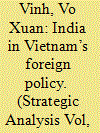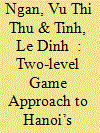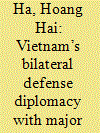| Srl | Item |
| 1 |
ID:
170535


|
|
|
|
|
| Summary/Abstract |
The upgrading of Vietnam–India relations from partnership (2003) to strategic partnership (2007) and a comprehensive strategic partnership (2016) is not merely the result of India’s Look/Act East Policy. It also reflects Vietnam’s high appreciation of the Indian factor in its foreign policy since the Southeast Asian country promoted multilateralism and diversification in its international relations. The article analyses the importance of India in Vietnam’s foreign policy since its reform by examining its relations with India in fields of strategic politics, security, and defence which were guidelined in important political documents of Communist Party of Vietnam (CPV).
|
|
|
|
|
|
|
|
|
|
|
|
|
|
|
|
| 2 |
ID:
190076


|
|
|
|
|
| Summary/Abstract |
In this article we elucidate the evolution of Hanoi’s foreign policy proactivism which has been understudied in the contemporary literature. In selective areas, why has Vietnam adopted a more proactive foreign policy than before? By means of ‘two-level game’ theory, official documents and research papers, and expert interviews, we analyze the foreign policy of Vietnam and compare it with that of Indonesia, ASEAN’s de facto leader, by examining the former’s role in the South China Sea issue and international economic integration strategy. In these aspects which Vietnam today has evinced its sectoral leadership, compared to Indonesia, the country has faced fewer constraints in domestic and international strategic environments to exert its diplomatic proactivism.
|
|
|
|
|
|
|
|
|
|
|
|
|
|
|
|
| 3 |
ID:
162452


|
|
|
|
|
| Summary/Abstract |
The paper explores the development of Vietnam’s bilateral defense diplomacy with
world and regional powers including the United States, India, and Japan, with a
particular focus on the period from 2009 to 2018. The paper finds that Vietnam’s
multidirectional defense diplomacy is fundamentally shaped by its historical
experience, the contemporary shift in the balance of power and the strategic
challenges caused by China’s emerging power. By pursuing a multi–polar balance
among major partners, Vietnam avoids being pulled into their rivalry, and keeps its
non-alignment as well as strategic autonomy. The international defense cooperation
has become further deepened and more substantive to satisfy Vietnam’s strategic
interests including national security, territorial integrity, economic development
and regime legitimacy. However, domestic and geo–strategic constraints, and
asymmetrical economic interdependence with China lead this paper to suppose
further challenges in the future of Vietnam’s defense diplomacy.
|
|
|
|
|
|
|
|
|
|
|
|
|
|
|
|
| 4 |
ID:
155395


|
|
|
|
|
| Summary/Abstract |
This article examines the dramatic shifts that Vietnam’s foreign policy has undergone over time, from a country tightly allied with Socialist partners like China and the Soviet Union to one that has diversified its strategic partners and foresworn alliances in order to protect its strategic autonomy. Vietnam’s adoption of Doi Moi or economic renovation led Vietnam to multilateralize and expand its economic and political partnerships in the quest for economic growth. Doi Moi’s success has produced a transformation in state–society relations as the rise in civil society organizations has weakened the VCP’s hegemonic grip on society and shifted the basis of regime legitimacy from nationalism and socialist ideology to performance legitimacy. As public opinion and elite factionalism play an increasing role in Vietnam foreign policy, managing Vietnam’s external ties has become increasingly difficult. This article concludes that public opinion regarding relations with China has become so toxic that it poses a serious challenge to the political legitimacy of Vietnam’s one-party regime should it fail to deter Chinese assertiveness in the South China Sea.
|
|
|
|
|
|
|
|
|
|
|
|
|
|
|
|